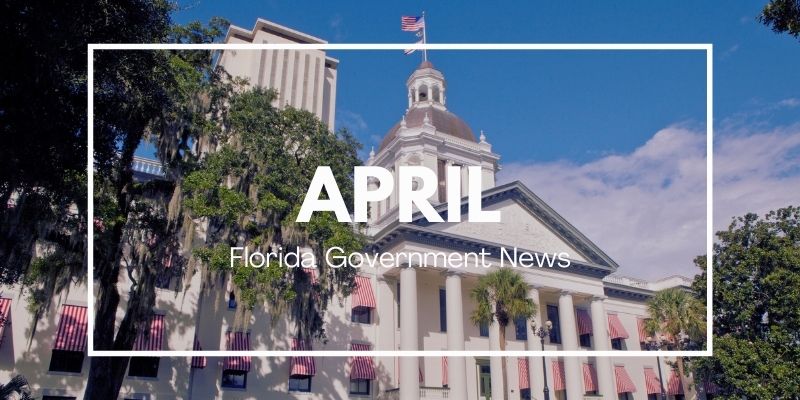
Florida’s annual 60-day legislative session ended on April 30. Lawmakers passed the first budget in state history to top $100 billion and sent 275 bills to the Governor for his signature. (News4Jax.com; Session Statistics Report)
In this post, I’ll recap important policy and budget decisions made in the session, and close with other highlights of the month. But first, an update on COVID-19 in the state.
COVID-19 News
Florida is doing much better than it was when I wrote last month’s post.

Thirty percent of Florida residents are fully vaccinated and 43 percent have had at least one dose, two percentage points behind the nation as a whole at 32 percent and 45 percent, respectively. (NYTimes)
Florida’s 7-day average number of coronavirus cases reported daily for the 14 days ended May 4 was down 27 percent from the prior period — to 4,595. But deaths in the 14 day period increased 7 percent. (NYTimes)

Florida’s decline in cases is comparable to the nation as a whole, but nationwide deaths declined 2 percent. (NYTimes)
Given recent improvements, on April 29, Florida Surgeon General Scott Rivkees said that fully vaccinated Floridians no longer need to wear face masks in public or avoid most social gatherings. (South Florida Sun Sentinel; FL Department of Health Advisory)
That guidance goes further than the CDC because it OKs vaccinated Floridians to go without their masks indoors too. (South Florida Sun Sentinel; CDC guidelines)
On May 3, Gov. DeSantis suspended COVID-19 restrictions statewide and signed a bill that, effective July 1, permanently prohibits “vaccine passports” and limits government’s ability to impose mask requirements and other social-distancing measures. (USA Today Network-Florida; SB 2006)
He also issued an Executive Order ending local COVID-19 restrictions and mandates on individuals and businesses, effective immediately. Importantly, the Executive Order does not apply to schools. (Tampa Bay Times)
Session Recap — Important New Laws
Voting and Election Law

A new law (SB 90) requires voters to sign up for mail-in ballots every year and carries greater ID and signature restrictions. It also makes it illegal to provide water or food to anyone waiting in line to vote, limits the number of mail-in ballots people could collect to drop off at voting sites. And it bans supervisors of elections from taking any money from third-party groups.
Drop boxes, initially proposed to be eliminated completely, may be placed in the supervisor’s office or in the place of early voting, but may not be left unsupervised. Gov. DeSantis is expected to sign it. (Orlando Sentinel)
COVID-19 liability protection
The first bill signed by Gov. DeSantis (SB 72) protects businesses, hospitals, nursing homes and other providers from COVID-19 liability. (Florida Bar News)
Online sales taxes
The second bill the Governor signed (SB 50) requires out-of-state online retailers to collect sales taxes on purchases made by Floridians. The estimated $1 billion a year in increased revenue will be used to replenish the state’s depleted unemployment trust fund and then toward reducing the commercial rent tax — both viewed as benefiting businesses, not consumers. (Miami Herald)
Anti-protest (aka anti-mob or anti-rioting) laws
The third bill signed to-date (HB 1) vastly increases law enforcement’s powers to crack down on civil unrest. Among other things, it creates a broad category for misdemeanor arrests during protests, and anyone charged under that provision will be denied bail until their first court appearance. It also creates a new felony crime of “aggravated rioting” that carries a sentence of up to 15 years in prison. The bill was one of the Governor’s earliest priorities, rolled out in the wake of police-brutality protests last summer. (Orlando Sentinel; Miami Herald)
It is already being challenged in court. (The Center Square | Florida)
Consolidation of state school scholarship (aka voucher) programs
A sweeping $200 million school-choice proposal (HB 7045) will combine and significantly expand the state’s voucher programs. It could allow tens of thousands of students to use taxpayer dollars to attend private schools. (Florida Today)
Restrictions on large technology companies
The proposed law (SB 7072), another of Gov. DeSantis’s priorities, prohibits social media companies from knowingly “deplatforming” political candidates, meaning a service could not “permanently delete or ban” a candidate. The state Elections Commission could fine a social media company $250,000 a day for statewide candidates and $25,000 a day for other candidates if it finds that a company’s actions violate the law. If signed as expected, it is likely to be challenged as violating the First Amendment speech rights of corporations. (NBC News)
Strengthening early learning
The Governor has signed two bills intended to improve the state’s kindergarten readiness rate. HB 419 calls for a new pre-K grading system that will enable the state to withhold funding from early learning coalitions as a way to enforce new accountability measures. HB 7011 sets up a statewide monitoring tool to gauge the academic progress of children from pre-K through eighth grade. (Miami Herald)
Police reform
A bill (HB 7051) that passed with bipartisan support covers de-escalation training, limits the use of chokeholds, and requires police officers to disclose whether they’ve ever been investigated for using excessive force. Officers will also have a duty to intervene if they see another officer using excessive force, and to provide medical help in those situations if needed. (WFSU Public Media)
Parents’ Bill of Rights
A “Parents’ Bill of Rights” (HB 241) will allow parents to more easily opt kids out of medical procedures like vaccinations or object to courses like sex education. (Treasure Coast Newspapers)
Property insurance revamp
A proposed overhaul of the state’s homeowner insurance regulations (SB 76) allows for larger rate hikes at state-run Citizens Property Insurance and changes how attorney fees are paid when there is litigation over a claim. It also prohibits building contractors from soliciting homeowners to file claims, and prohibits contractors and public adjustors from offering incentives for roof inspections and claims. (Sarasota Herald-Tribune)
”No fault” auto insurance repeal
Lawmakers repealed Florida’s decades-old “no fault” auto insurance system and the requirement to carry personal-injury protection (PIP) coverage (SB 54). If signed by the Governor, motorists would need to have bodily injury coverage instead. (Tampa Bay Times)
M-CORES toll roads repeal
The Legislature repealed (SB 100) a 2019 law that would have created three new, controversial toll roads through underdeveloped and environmentally sensitive parts of Florida and shifted hundreds of millions in state highway funding to build them. Critics, including environmentalists, had derided the plan as “roads to nowhere.” (Tallahassee Democrat)
Energy preemption
A controversial bill (HB 919) would preempt cities or counties from restricting which forms of energy, particularly natural gas, can be used or provided. Environmentalists say it could hamper efforts of communities to move to 100% clean energy. (WUSF Public Media)
Right to farm
A bill (SB 88) that was a priority of Senate President Simpson, an egg farmer by trade, expands the state’s “Right to Farm” law and shields the agriculture industry from what it considers nuisance lawsuits. Critics argue that it will limit lawsuits over the potential health impacts from things like burning sugar cane. (WGCU)
Expanded scope for physician assistants
A new law (HB 431) would allow 10 physicians assistants to work under a doctor, up from the current four. PAs would also be allowed to sign and authenticate any document a physician can, like Baker Act commitments, do-not-resuscitate orders, school physicals and death certificates. But licenses for medical marijuana would still be left to doctors. (Florida Politics)
Vaccine passport ban
A new law (SB 2006) will allow Florida to fine any business or school $5,000 each time it requires a “vaccine passport,” or proof of COVID-19 vaccination, for entry or participation. (The Center Square | Florida)
Transgender athlete ban
Transgender female athletes will be limited to playing coed sports or on teams with male athletes. Female teams will be limited to individuals identified as female on their birth certificate. Gov. DeSantis said he will sign the charter school bill (SB 1028) which includes the ban. (Tampa Bay Times)
University political bias surveys
A new law (HB 233) will require Florida’s public universities to ask students and faculty to complete yearly surveys to identify political bias in college classrooms. It will also allow students to record their professors during lectures to show evidence of political bias. (WUFT)
Session Recap — The Budget

Florida’s 2021-22 budget (SB 2500) passed by near-unanimous votes in both chambers on the last day of session. It includes more than 600 local projects, everything from programs for people with disabilities, after-school and mentoring programs, and infrastructure projects at colleges and universities. (Florida Phoenix)
The single biggest budget in state history benefited from $10 billion in federal stimulus money and $13 billion in COVID education relief funds. That money enabled legislative leaders to “deliver hometown projects in exchange for votes from both parties on nearly all their controversial issues.” (Miami Herald)
For a budget summary by program area, click here.
PreK-12 education
- Per-student funding — a $38 increase in total funds per student to $7,795;
- Teacher pay — an increase of $50 million from this year, to continue raising the minimum K-12 teacher salary to $47,500, as well as the salaries of other instructional personnel (News4Jax.com);
- Educator bonuses — $1,000 for classroom teachers, certified pre-K teachers and principals, funded with $216 million of federal dollars;
- School mental health programs — $120 million, an increase of $20 million from this year.
For the Florida Teachers’ Union session summary, see “Budget Rundown, What Passed, and What Failed”
Other budget highlights
- $2 billion for the state highway system and Florida ports for infrastructure improvements and enhancements;
- $1.8 billion for water quality and environmental protection, split among Resilient Florida Grants, the Wastewater Grant Program, the Wildlife Corridor (DEP Land Acquisition), cleaning up Piney Point, Coastal Mapping Services, and more;
- $950.4 million for child care assistance for essential workers, including health care sector employees, emergency responders and sanitation workers;
- $239.8 million to extend Medicaid benefits for new mothers to 12 months postpartum;
- Full funding for Medicaid, a relief for Florida’s bruised hospital networks that were bracing for cuts that could have been catastrophic;
- $43 million to raise the minimum wage for state employees to $13 an hour;
- 10 percent pay raises for state attorneys, public defenders and DCA judges;
- $1,000 bonus payments for emergency responders, and a $1 billion Emergency Preparedness and Response Fund;
- $134 million in tax relief for Florida families in the form of three non-recurring sales tax holidays: Back to School ($69.4 million), Disaster Preparedness ($10.1 million), and a new Freedom Week ($54.7 million).
In Other Florida Government News
- Florida order waives passage of state exams for graduation or promotion during pandemic. News Service of Florida via Panama City News Herald, 4/9/21
- Florida Supreme Court kills amendment to legalize recreational marijuana. Orlando Sentinel, 4/22/21
- DeSantis, Army Corps reach deal on major Everglades project. Associated Press, 4/22/21
- Special session for gaming compact slated for May 17. Florida Politics, 4/23/21
- Ashley Moody seeks injunction to resume cruises In Florida. WUSF Public Media, 4/23/21
- Florida’s population boom will give it another seat in the U.S. House. Tampa Bay Times, 4/26/21
- State extends work search waiver for unemployed Floridians through May 29. Florida Politics, 4/28/21
